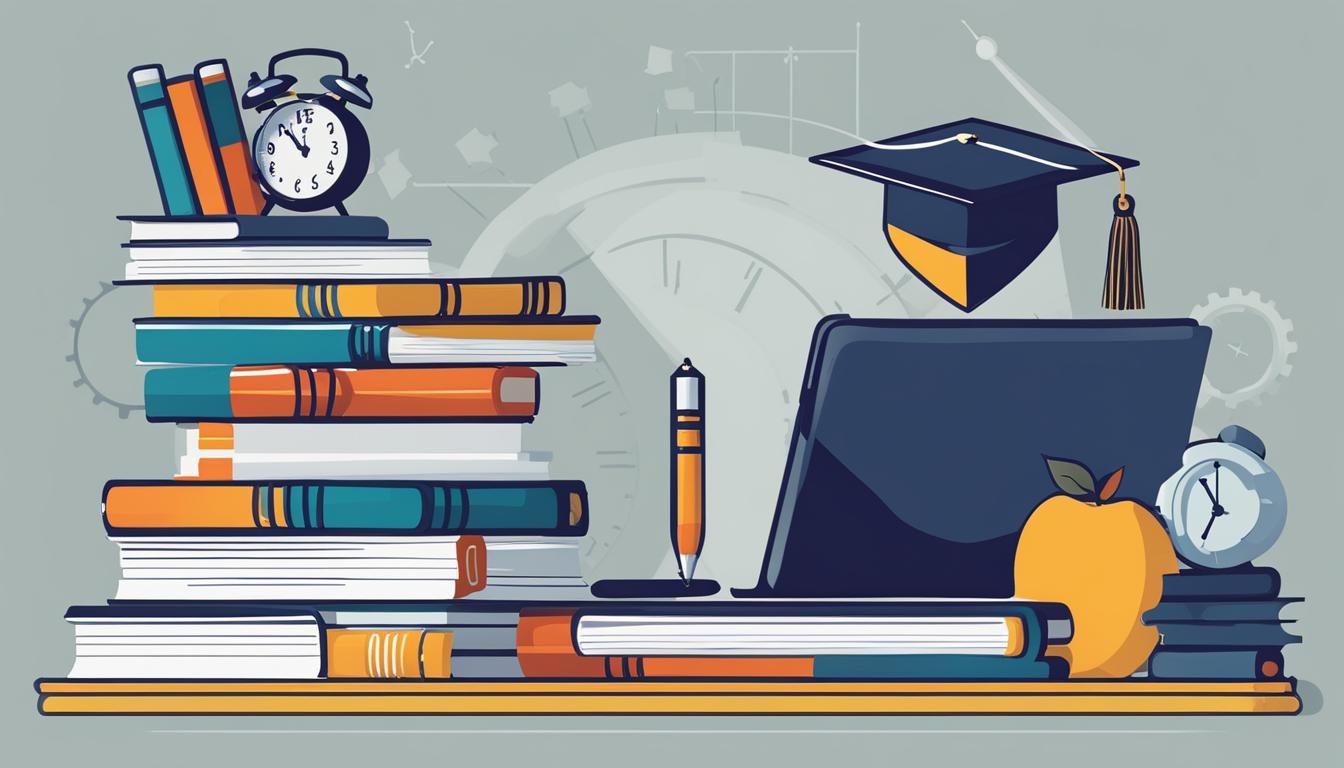Attaining success in college requires more than just attending classes and completing assignments. It demands the mastery of effective study skills and techniques that can maximize your learning potential and pave the way for academic excellence. By honing these essential skills, you can enhance your understanding of complex subjects, improve memory retention, and ultimately achieve your goals.
Throughout your college journey, developing study skills tailored to your learning style is vital. Adopting the right strategies can significantly impact your ability to absorb information and excel in your coursework. By implementing these techniques, you can unlock your full academic potential and set yourself up for success in college and beyond.
Key Takeaways:
- Mastering study skills is crucial for success in college.
- Effective study techniques can improve understanding and memory retention.
- Everyone has their own learning style, but certain study skills are universally effective.
- Focus on the five most effective study skills for college.
- The study cycle provides a guide for effective studying in multiple stages.
Understanding Study Skills and Their Importance

Study skills are essential tools that students can utilize to effectively absorb and understand information. These techniques are applicable across various subjects and can be adapted to different learning situations. It is important to recognize that each individual has their own unique learning style and preferences. However, there are specific study skills that have proven to be effective for all students.
By enhancing their study skills, students can improve their ability to acquire and retain information. These skills help in optimizing learning outcomes and contribute to overall academic success. Whether it is reading, note-taking, or time management, mastering study skills enables students to become more efficient learners.
One of the key study skills is understanding one’s learning style. Visual, auditory, and kinesthetic learners have distinct ways of processing information. Identifying and leveraging one’s preferred learning style can enhance information absorption and overall comprehension.
Importance of Study Skills:
- Improve information absorption and understanding
- Enhance memory retention
- Increase academic performance
- Optimize learning outcomes
- Adaptability to different learning situations
By developing and implementing effective study skills, students can maximize their potential for success in college. These skills serve as the foundation for efficient studying, enabling students to make the most of their educational journey.
Next, we will explore the five most effective study skills for college. These skills provide a comprehensive toolkit for students to excel academically and apply their knowledge in real-life scenarios.
The 5 Most Effective Study Skills for College
To achieve success in college, it is crucial for students to master effective study skills and techniques. While there are numerous study skills available, focusing on the following five can make a significant difference in college performance. Not only are these skills useful for academic success, but they can also be applied to real-life situations:
- Time Management: Develop a study schedule and prioritize tasks to ensure efficient use of time. Break down larger tasks into smaller, manageable ones to prevent overwhelm.
- Note-Taking: Take organized and comprehensive notes during lectures and reading assignments. Use abbreviations, symbols, and highlighting techniques to emphasize key points.
- Active Learning: Engage actively in the learning process by participating in class discussions, asking questions, and seeking clarification. Find practical ways to apply concepts and connect them to real-world examples.
- Memory Techniques: Utilize mnemonic devices, visualization, and repetition to enhance memory retention. Practice recalling information instead of simply re-reading or reviewing.
- Self-Assessment: Regularly evaluate your own understanding of the material through self-quizzing and practice tests. Identify areas of weakness and seek additional resources or assistance when needed.
By incorporating these study skills into your college journey, you can enhance your academic performance and improve your chances of success. These skills provide a solid foundation for effective studying and learning, both inside and outside the classroom.
Studying Techniques for Different Learning Styles
While the above study skills can benefit all students, it is important to acknowledge that everyone has their own unique learning style and preferences. Some learners may find certain techniques more effective than others. It is essential to identify your learning style and adapt the study skills accordingly. Here are a few additional techniques that can be tailored to different learning styles:
- Visual Learners: Utilize diagrams, charts, and visual aids to represent information. Create mind maps or use flashcards with color-coded visuals to enhance understanding and recall.
- Auditory Learners: Record lectures and listen to them while reviewing notes. Engage in group discussions or explain concepts aloud to reinforce understanding.
- Kinesthetic Learners: Incorporate movement and hands-on activities into studying. Take breaks for physical exercise during study sessions or use manipulative materials for learning.
By recognizing your learning style and tailoring your study techniques, you can optimize the learning process and improve your overall college success.
The Study Cycle: A Guide for Effective Studying
When it comes to effective studying, one useful tool to incorporate into your routine is the study cycle. The study cycle provides a structured approach to learning, breaking down the process into various stages that can help improve comprehension and retention of information.
Stage 1: Previewing Material
The first stage of the study cycle is previewing the material before diving into the details. This involves skimming through the content, scanning headings, subheadings, and summaries to get a general idea of what will be covered. Previewing the material helps activate prior knowledge and create a mental framework that makes it easier to understand and remember information.
Stage 2: Attending Class
Attending class is a crucial part of effective studying. Actively engage in the lecture or discussion, take detailed notes, and ask questions to clarify any uncertainties. Being present in class allows you to gain a deeper understanding of the material and fill in any gaps that may exist in your knowledge.
Stage 3: Reviewing Notes
After attending class, it’s important to review your notes as soon as possible. This helps reinforce the information you learned and identify any areas that require further clarification or study. Take the time to organize your notes, highlight key points, and make connections between different concepts to enhance your understanding.
Stage 4: Scheduling Study Sessions
Scheduling dedicated study sessions is crucial for effective studying. Set aside specific blocks of time where you can focus solely on reviewing and practicing the material. Create a study schedule that aligns with your preferences and learning style, whether it’s studying in short bursts or longer, focused sessions. Consistency and regularity are key.
Stage 5: Self-Evaluation
Self-evaluation allows you to assess your understanding and progress. Take the time to test yourself by answering practice questions, completing quizzes, or explaining concepts to others. Reflect on what you’ve learned and identify areas that still need improvement. This stage helps consolidate your knowledge and identify any gaps in your understanding.
By following the study cycle and incorporating these stages into your study routine, you can enhance your learning and improve your overall academic performance. Remember, effective studying takes practice and dedication, but the results are worth it.
Tips to Improve Study Habits and Techniques

Improving study habits and techniques is crucial for achieving success in college. By implementing effective strategies, students can maximize their learning potential and enhance their academic performance. Here are some valuable tips to help you improve your study habits:
1. Create a Study Schedule
Developing a study schedule can help you stay organized and manage your time effectively. Allocate specific time slots for studying each subject, ensuring that you have enough time to cover all the necessary material. Stick to your schedule and prioritize your most challenging subjects during your peak concentration hours.
2. Use Active Learning Techniques
Instead of passively reading or listening to lectures, engage in active learning techniques to enhance your understanding and retention of information. This can include summarizing key concepts in your own words, teaching the material to someone else, or participating in group discussions and study sessions. Actively applying your knowledge helps reinforce learning and improves long-term memory.
3. Optimize Your Study Environment
Creating an optimal study environment is essential for maintaining focus and productivity. Find a quiet and well-lit space where you can study without distractions. Get rid of any clutter and ensure that you have all the necessary materials and resources within reach. Experiment with ambient noise or background music, as different individuals may have different preferences for optimal concentration.
4. Take Breaks and Practice Self-Care
While studying is important, it’s equally essential to take regular breaks and prioritize self-care. Overworking yourself can lead to burnout and decreased productivity. Schedule short breaks every hour or so, during which you can stretch, hydrate, or engage in a quick relaxation activity. Additionally, make sure to get enough sleep, eat a balanced diet, and exercise regularly to maintain your overall well-being.
By implementing these tips, you can improve your study habits and techniques, leading to more effective and efficient learning. Remember, everyone’s study preferences and methods may vary, so it’s important to find what works best for you and adapt these strategies accordingly.
Conclusion
Mastering effective study skills and techniques is paramount for college success. By incorporating these skills into their academic routine, students can greatly enhance their learning experience and improve their chances of achieving their goals.
Approaching studying with a clear purpose is key. Understanding the importance of each study skill and how it applies to different subjects and learning situations will enable students to absorb and comprehend information better.
Creating a study routine and sticking to it is another vital aspect of effective studying. By scheduling regular study sessions and dedicating time to review and self-evaluate, students can strengthen their understanding of the material and be well-prepared for exams.
Lastly, it’s crucial for students to adapt and refine their study habits based on their individual needs and preferences. Each student has a unique learning style, and tailoring study techniques to suit their strengths will maximize their chances of success in college.
FAQ
What are study skills?
Study skills are techniques that students can use to absorb and understand information, improve memory retention, and enhance academic performance.
Are study skills transferable?
Yes, study skills are transferable across all subjects and can be applied to various learning situations.
Do study skills work for all students?
While everyone has their own learning style and preferences, certain study skills are proven to be effective for all students.
How can the study cycle help with effective studying?
The study cycle is a guide for effective studying that consists of multiple stages, including previewing material, attending class, reviewing notes, scheduling study sessions, and self-evaluation.
Any additional tips to improve study habits and techniques?
Yes, additional tips include: creating a study routine, staying organized, seeking help when needed, and utilizing study aids like flashcards or mnemonic devices.


